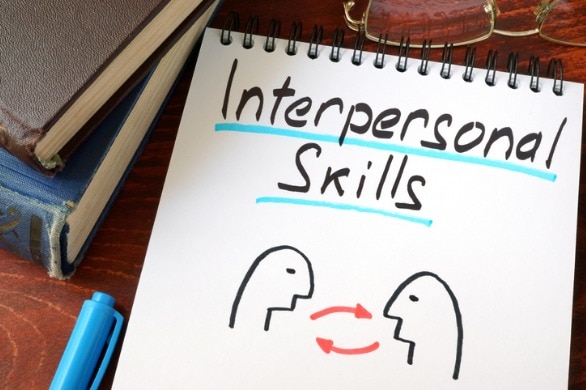
Interpersonal Skills: Top Examples - Jobs.ie
INTERPERSONAL SKILLS
Posted 2 years ago
A Friendly Ear: What Are the Interpersonal Skills You Need to Succeed?
It is no longer enough to only have excellent technical skills in today’s job market. When you apply for a role, what really separates you from the rest are your interpersonal skills; your ability to show the interviewer that you fit within the company’s culture. Interpersonal skills should complement your technical ability, and improve your social interactions & performance, particularly if you apply for an interpersonal skills role. Read on to find out more.
What Are Interpersonal Skills?
These are behaviours and qualities we showcase when communicating with others. Interpersonal skills are one of the most highly sought after ‘soft’ skills. Even the rudimentary aspects of interaction, such as attitude towards others and body language, are important facets of an individual’s interpersonal skills.
The Importance of Interpersonal Skills
Interpersonal skills are considered a major indicator of success in the workplace because they enable you to communicate effectively with colleagues, help your team solve problems, and improve the general office mood. On the other side of the fence, a shortfall in interpersonal skills could lead to workplace conflict with colleagues and management.
When you apply for any role, you must consider the types of interpersonal skills you need. Next, do your best to match the required skills with examples from previous work and life experience.
Good Examples
Communication
Ideally, you will end up possessing the ability to explain complex ideas so that they become easy to follow guides. It is important to note that only around 7% of all communication is verbal; the rest is comprised of non-verbal cues such as body language, eye contact, and facial expressions.
Although you need excellent communication skills in all fields, those who wish to work in sales need to step up their game. Remember, when selling products or services, the prospect decides if he likes you first before making a decision. It is rare for a person to buy anything from an individual they don’t like!
Active Listening
This involves clearly understanding all instructions to ensure work is conducted to the desired standard. It is an especially important skill in the customer service industry because it involves understanding what the consumer needs, before finding a way to keep them satisfied.
Problem Solving
Organisations are always happy to hire resourceful individuals with analytical skills. If there is a problem, and you don’t yet have an answer, you need to learn how to keep looking and how to think ‘outside of the box.’ You need to be a ‘big picture’ thinker and also take responsibility for mistakes as and when necessary.
Team Player
In the modern workplace, employees are expected to make themselves available to help colleagues when necessary. Those who have effective team working skills understand when leadership is needed and when it is necessary to step in and help. Good teamworking typically involves the use of communication, negotiation and emotional intelligence.
Teamwork is especially important in a highly technical role such as IT or design. Most of all, you need to display the ability to work well within a culturally diverse environment.
Empathy
You can display empathy in a myriad of ways. For instance, you could be there to listen to a colleague who is having issues in the workplace, or step in to help a project when there is a problem. It is an especially important trait in roles such as that of a teacher or care worker.
Time Management
This is a skill that is beneficial throughout life. In many ways, time management is an art form because you need to find creative ways to get more from the limited hours you have. In the workplace, this means knowing which tasks to prioritise and which ones can be left until last. Work, study, and domestic responsibilities take up a tremendous amount of time. Long-term career success is only achievable when you can balance everything and still find extra time for relaxation.
Leadership
Companies are always seeking highly motivated individuals with the capacity to bring their energy to a group and help lead it in the right direction. Having Leadership skills means a lot more than merely giving orders; it is also about getting the best out of every employee and helping each individual understand that they are providing a valuable service to the team.
You need tremendous self-confidence and poise to be a real leader, and industries such as finance are crying out for leaders in executive positions. You must also be an example for others to follow.
List your skills for a CV
Interpersonal Skills in Healthcare
- Empathy
- Kindness
- Respect
- Caring
- Sympathy
Interpersonal Skills in Childcare
- Compassion
- Patience
- Sensitivity
- Listening
- Encouraging
Interpersonal Skills in Social Care
- Friendly
- Active listener
- Charisma
- Positive Body Language
- Relationship Management
Interpersonal Skills in Psychology
- Patience
- Problem Solving
- Work Ethic
- Self-Confidence
- Emotional Intelligence
Interpersonal Skills in Management
- Communication
- Teamworking
- Leadership
- Receptiveness to Feedback
- Negotiation
Interpersonal Skills as a Teacher
- Patience
- Reliability
- Empathy
- Active Listening
- Time Management
Interpersonal Skills Customer Service
- Coping with Pressure
- Flexibility
- Professionalism
- Ability to Accept Negative Feedback
- Active Listening
Interpersonal Skills Human Resources
- Employee Relations
- Teamwork & Collaboration
- Critical Thinking
- Strong Ethics
- Communication
Interpersonal Skills Marketing
- Persuasion
- Negotiation
- Body Language
- Positivity
- Leadership
Interpersonal Skills Lawyer
- Time Management
- Resilience
- Self-Confidence
- Written and Oral Communication
- Teamwork
Interpersonal Skills Receptionist
- Friendliness
- Active Listening
- Dependability
- Relationship Management
- Showing Appreciation
How to Improve These Skills
You cannot rely on any textbook to ‘learn’ the above skills. For some, they come naturally while others need to work hard to identify their skills and cultivate them. Even if you believe certain traits are innate, it important to improve the ones you have if you wish to make yourself a more attractive proposition to an employer.
You can begin by expressing appreciation for your team, practising empathy, trying to get control of disputes before they escalate, and plan what you want to say rather than blurting it out. Active listening is another key interpersonal skill and is one that can be acquired. Practice it by repeating what the person said to make sure communication is occurring.









